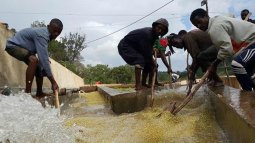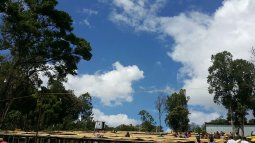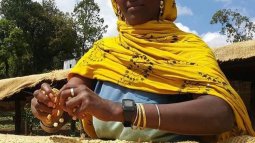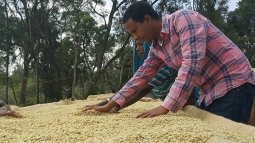There are around 850 smallholder farmers who tender cherry to the Gigesa Washing Station in Shakisso, in the Oromia region of Ethiopia, which borders Sidama to the southeast. The average farm size is 2.5 hectares, with corn, grains, and false banana typically growing alongside the coffee, as well as Birbira, Wanza, and Acacia trees for shade. The wet mill uses clean river water to process its washed coffee, which are fermented underwater in tanks for 48 hours before being washed clean of its mucilage and dried on raised beds. The farms range in elevation from 1800–1950 meters above sea level, and temperatures are moderate, reaching up to around 77° Fahrenheit during the day, and cooling to around 60° Fahrenheit at night.
Aside from its near-legendary status as the "birthplace" of Arabica coffee, there is much to love about Ethiopia as a producing nation, including but not limited to the incredible diversity of flavor and character that exists among microregions, specifically within the southwestern Gedeo Zone of Yirgacheffe within the region of Sidama -- areas whose names alone conjure thoughts of the finest coffees in the world. Coffee was literally made to thrive in the lush environment Yirgacheffe’s forests provide, developing nuanced floral characteristics, articulate sweetness and sparkling acidity. However, coffee has also adapted to the more arid climate of Harrar, in the northeast of the country; the varieties planted there have historically had more chocolatey, rich undertones. Processing, of course, also plays a significant part in what makes Ethiopian coffees distinct -- both distinctly Ethiopian, as well as distinct from one another, washed or natural. One of the other things that make Ethiopia distinct as a growing country is the complexity involved in the coffee market there, and the myriad systems and customs that ensure there's never a dull moment in sourcing the best lots, whether they are from individual farms, co-operatives or grower groups, or from the Ethiopian Commodity Exchange (ECX), a market institution founded in 2008 in attempt to protect small farmers from various risks and market forces that threaten the profitability of their harvest. Cafe Imports is proud to offer a variety of Ethiopian coffees -- an inventory not simply diverse in flavor, but that also represents the various relationships and buying practices that exist within coffee's native region.






